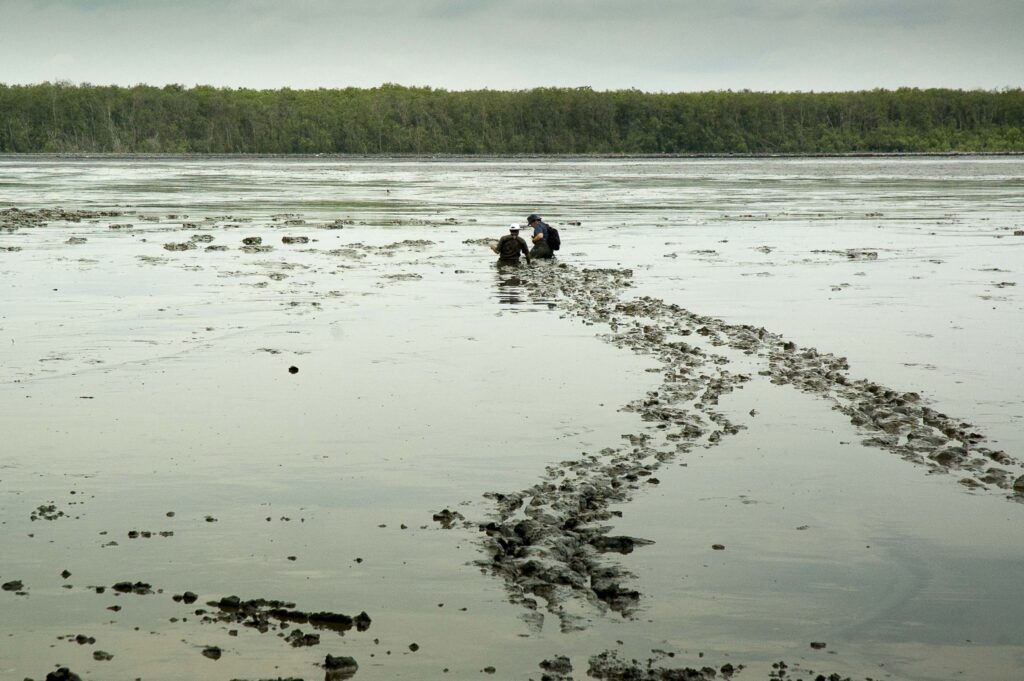By Lauren Barnett, UF College of Liberal Arts and Sciences
Mud can be surprisingly clear. A global team of scientists has uncovered a hidden truth: Human actions are shaping the journey of mud. Over the course of decades, our activities have wielded significant influence over the movement and dispersion of mud, affecting carbon storage and cycling worldwide.
The new study, led by University of Florida biogeochemist Thomas S. Bianchi, holds significant implications for understanding historical climate shifts and potential future scenarios. The researchers identified direct links between human activities and the movement of mud from its source to its destination.

Published last week in Nature Geoscience, the research examines the heightened flow of mud and related organic carbon in diverse environments. The team identified direct links between human interventions, such as dam construction, levee-building and land-use changes, and the reshaping of mud flow patterns globally.
Mud holds profound insights into how our planet operates. It serves as a linchpin in how carbon moves around our planet. It’s a key player in regulating Earth’s climate by storing and cycling carbon. Mud also acts as a repository for organic carbon, playing a pivotal role in its sequestration and burial across landscapes.
“Mud has been an essential component in shaping the planet’s ecosystems and the organisms that inhabit them,” said Bianchi. “This link between mud and microbial evolution is relevant to understanding past and potential future shifts in weathering, biogeochemical cycles and climate.”
According to Bianchi, humans have had a long and complex relationship with mud throughout history. It’s been an essential resource to cultures and societies worldwide, but human activities have long interfered with mud processes. This has been expedited since the start of the second half of the 20th century, a time of dramatic surge across human activity known as the Great Acceleration.
“The history of Earth’s climate has sparked widespread interest in the field of geosciences,
said Bianchi, “particularly focusing on the connections between mud and organic carbon that emerged in the mid-1800s.”
While much attention has been given to the thawing of carbon in colder regions, explains Bianchi, the scientific community is just beginning to grasp the implications of climate change for the stability of carbon in mud, particularly in tropical areas.

“Given that the destiny of mud-organic carbon significantly increases greenhouse gas emissions and carbon sequestration and burial in the biosphere, crucial questions are remaining about how these human-driven alterations will influence the carbon cycle and climate in the 21st century,” Bianchi said.
Looking ahead, Bianchi is preparing for further studies to expand on the global-scale assessment of mud-organic carbon changes. With advancements in analytical techniques and data aggregation tools, he says, we can now quantify these changes on a global scale compared to historical conditions.
Bianchi also notes that while human activities have increased the movement and burial of mud-organic carbon from sources such as mountain glaciers, land erosion, dams and reservoirs, permafrost melting and coastal areas, other environments need further exploration. While the specific effects on tidal flats and floodplains remain uncertain, Bianchi says, coastal wetlands are likely experiencing a net decrease.
“We plan to continue to look across mud transport across landscapes, from the mountains to the sea, to explore how humans continue to change the biosphere and how that impacts greenhouse gas cycling,” he said.
Read the full study here.
This piece was originally published at https://news.clas.ufl.edu/humans-shape-mud/.
Sign up for The Invading Sea newsletter by visiting here. If you are interested in submitting an opinion piece to The Invading Sea, email Editor Nathan Crabbe at nc*****@*au.edu.



